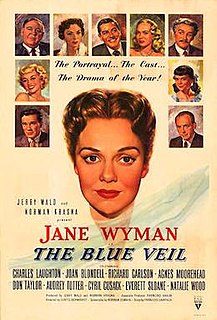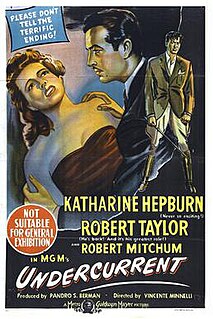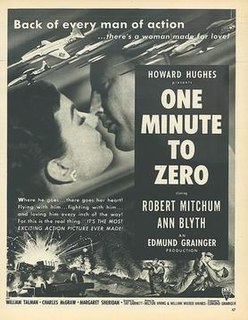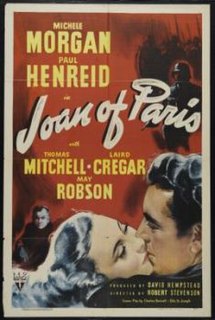
The Blue Veil is a 1951 American historical drama film directed by Curtis Bernhardt and starring Jane Wyman, Charles Laughton and Joan Blondell. It tells the story of a woman who spends her life caring for other people’s children, beginning just after World War I. The title refers to the headdresses once worn by governesses and nannies, colored blue to distinguish them from the white veils worn by medical nurses. The screenplay by Norman Corwin is based on a story by François Campaux, adapted for the French-language film Le Voile Bleu in 1942.
Jerome Chodorov was an American playwright, librettist, and screenwriter. He co-wrote the book with Joseph A. Fields for the original Broadway musical Wonderful Town starring Rosalind Russell. The musical was based on short stories by Ruth McKenney.

Murder, My Sweet is a 1944 American film noir, directed by Edward Dmytryk and starring Dick Powell, Claire Trevor and Anne Shirley. The film is based on Raymond Chandler's 1940 novel Farewell, My Lovely. It was the first film to feature Chandler's primary character, the hard-boiled private detective Philip Marlowe.

The Spiral Staircase is a 1946 American psychological horror film directed by Robert Siodmak and starring Dorothy McGuire, George Brent, and Ethel Barrymore. Adapted from Ethel Lina White's British novel Some Must Watch (1933) by screenwriter Mel Dinelli, the film follows a mute young woman in an early-20th century Vermont town being terrorized by a serial killer who targets disabled women.

The Enchanted Cottage is a 1945 American romantic fantasy starring Dorothy McGuire, Robert Young, and Herbert Marshall, with Mildred Natwick.

Lady Luck is a 1946 American comedy film starring Robert Young and Barbara Hale. The picture tells the story of a professional gambler who falls in love with a woman who hates gambling and tries to reform him.

Undercurrent is a 1946 American film noir drama directed by Vincente Minnelli and starring Katharine Hepburn, Robert Taylor, and Robert Mitchum. The screenplay was written by Edward Chodorov, based on the story "You Were There'" by Thelma Strabel, and allegedly contained uncredited contributions from Marguerite Roberts.

Beyond Tomorrow is a 1940 American fantasy film directed by A. Edward Sutherland and produced by noted cinematographer Lee Garmes; Garmes was one of a handful of cinematographers who became film producers.

Beware, My Lovely is a 1952 film noir crime film directed by Harry Horner starring Ida Lupino, Robert Ryan and Taylor Holmes. The film is based on the 1950 play The Man by Mel Dinelli, who also wrote the screenplay.

One Minute to Zero is a 1952 American romantic war film starring Robert Mitchum and Ann Blyth, set during the opening phases of the Korean War, and produced by Howard Hughes as his last film as producer. Victor Young's score for the film includes the first appearance of "When I Fall In Love." The film showcases the contributions of the U.S. Army and U.S. Air Force, the South Korean Army, the United Nations, the British Army and the Royal Australian Air Force during the early days of the Korean War. The effects of air power in the Korean War were also vividly depicted through the use of combat footage.

Hitler's Children is a 1943 American black-and-white propaganda film made by RKO Radio Pictures. The film stars Tim Holt, Bonita Granville and Kent Smith and was directed by Edward Dmytryk from an adaptation by Emmet Lavery of Gregor Ziemer's book Education for Death.

Every Girl Should Be Married is a 1948 American romantic comedy film directed by Don Hartman and starring Cary Grant, Betsy Drake and Franchot Tone. Grant and Drake married a year after the film's release.

Joan of Paris is a 1942 war film about five Royal Air Force pilots shot down over Nazi-occupied France during World War II and their attempt to escape to England. It stars Michèle Morgan and Paul Henreid, with Thomas Mitchell, Laird Cregar and May Robson in her last role.

The Gay Falcon is a 1941 B film, the first in a series of 16 films about a suave detective nicknamed The Falcon. Intended to replace the earlier The Saint detective series, the first film took its title from the lead character, Gay Laurence. George Sanders was cast in the title role; he had played The Saint in the prior RKO series. He was teamed again with Wendy Barrie who had been with him in three previous Saint films. The first four films starred Sanders as Gay Lawrence and the rest featured Tom Conway, Sanders' real-life brother, as Tom Lawrence, brother of Gay.

Double Harness (1933) is an American pre-Code film starring Ann Harding and William Powell. It was based on the play of the same name by Edward Poor Montgomery. A young woman maneuvers a lazy playboy into marrying her.

From This Day Forward is a 1946 American drama film directed by John Berry, starring Joan Fontaine and Mark Stevens.

Government Girl is a 1943 American romantic-comedy film, produced and directed by Dudley Nichols and starring Olivia de Havilland and Sonny Tufts. Based on a story by Adela Rogers St. Johns, and written by Dudley Nichols and Budd Schulberg, the film is about a secretary working in a factory during World War II who helps her boss navigate the complex political machinations of government in an effort to build bomber aircraft for the war effort.

A Date with the Falcon is the second in a series of 16 films about the suave detective nicknamed The Falcon. The 1942 sequel features many of the same characters as the first film, The Gay Falcon (1941).

The Falcon Out West is a 1944 American mystery film directed by William Clemens and starring Tom Conway, Joan Barclay and Barbara Hale. The film was part of RKO's The Falcon series of detective films, this time, a murder set in Texas.


















